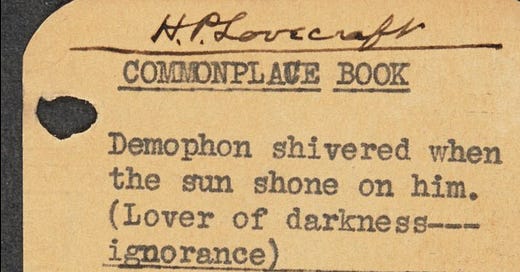I have to start with a premise on language. For once I would like to write in English hoping that those of you who are here only for my Latin trifles won’t get too mad. First, I am at a strange moment of my life where I’ve written more things in Latin than English. Even my mother tongue, Italian, is a bit unused, if I consider only “poetry” (I’m more a versifier than a poet). Second, I want to prove to myself that I’m able to write something better and longer than the dry writing tasks I had to do for the IELTS test.
The idea for this post came to me after reading James Burton’s blog “Undead Author Society” where he presents his research concerning the fragments left by dead writers and poets and then reanimates the single stories. As far as I know his project halted in 2021 and I don’t know if he will keep writing these short stories in the future, but nevertheless I recommend you to give a look at his blog, because I enjoyed very much reading it. The project, as it currently stands, is entirely devoted to the exploration of Lovecraft’s Commonplace Book, which is, as the name suggests, a small book containing Lovecraft’s ideas for horror stories in the form of quotes and short phrases.
The first post in the series is about the first note of Lovecraft’s Commonplace Book.
Who is this Demophon who trembles under the sun as if it were cold?
James Burton thinks that the note is about Demophoon of Athens, son of Theseus and Phaedra, but unfortunately his «quick search on Wikipedia» led him astray. The myth of Demophoon is as follows according to Apollodorus (Epitomē XV.6.16). He was returning home from Troy, where he had fought with his brother Acamas to rescue their grandmother Aethra, and then he landed in Thrace and married Phyllis, the daughter of the King of Bisaltia. After a while he begged her to let him sail to Athens promising to return. Phyllis escorted him to Amphipolis (Ennea Hodoi) and gave him a chest containing something sacred to Rhea. She told him to open it when every hope to return to Thrace was lost. He never came back but settled in Cyprus instead. Phyllis after having waited for him in vain committed suicide. Then Demophoon opened the chest out of curiosity, went mad because of fear of what was inside and died falling from horse on his own sword. To be fair James Burton was fascinated by Demophoon’s madness and Rhea symbology, which fit the common Lovecraftian trope of going mad from experiencing something men are not meant to comprehend.
This myth inspired Ovid to compose the second letter of Hērōidēs. It’s very touching. For example here Phyllis asks herself if the tears of Demophoon were fake or real:
vv. 49-52
Crēdidimus blandīs, quōrum tibi cōpia, verbīs;
Crēdidimus generī nōminibusque tuīs;
Crēdidimus lacrimīs—an et hae simulāre docentur?
Hae quoque habent artēs, quāque jubentur, eunt?
Coming back to the question of this post, I found a revealing passage from Thomas Moore’s prefatory letter on Irish music to the Marchioness Dowager of Donegal, which shows that the source of the quote about Demophon is Sextus Empiricus:
To those who identify nationality with treason, and who see, in every effort for Ireland, a system of hostility towards England, — to those too, who, nursed in the gloom of prejudice, are alarmed by the faintest gleam of liberality that threatens to disturb their darkness (like that Demophon of old, who, when the sun shone upon him, shivered!* [emphasis added]) — to such men I shall not deign to apologize for the warmth of any political sentiment which may occur in the course of these pages.
* This emblem of modern bigots was head-butler (τραπεζοποιός) to Alexander the Great. — Sext. Empir. Pyrrh. Hypoth. lib. I
Furthermore, we know that Lovecraft read Thomas Moore’s works and appreciated1 at least two poems: The Ring and Alciphron. Also from his note love of darkness means ignorance, therefore bigotry.
Sextus Empiricus was a Greek Pyrrhonist philosopher whose works are a major source of information about Pyrrhonism and other Hellenistic philosophies. In the fourteenth chapter of his Outlines of Pyrrhonism Sextus Empiricus says that there are ten “modes” that generate suspension of judgement. The second mode is based on the difference between human beings. As an example he talks about Demophon, the head-butler of Alexander, who used to shiver under the sun and in the bath, but felt warm in the shade.
Sextī Empiricī Pyrrhōniae Hypotyposēs I.14 dē secundō modō
καὶ Δημοφῶν μὲν ὁ Ἀλεξάνδρου τραπεζοποιὸς ἐν ἡλίῳ γενόμενος ἢ ἐν βαλανείῳ ἐρρίγου, ἐν σκιᾷ δὲ ἐθάλπετο.
et Dēmophōn quidem, quī Alexandrō mēnsae structor erat, quum ad sōlem stābat aut in balneō erat, algēbat, in umbrā autem calescēbat.
Here’s the answer.
Now the question is: what story would you write with this prompt?
Dē historiā Necronomicōn
Necronomica ab Abdullā Alhazred, poētā īnsānō, composita sunt, quī fertur Sanae in Arabiā Fēlīcī vīxisse sub calīfīs Damascēnīs circā annum Dominī DCC. Postquam Babylōnis parietinās et Memphis arcāna subterrānea vīsit, is sōlus decem annōs in Arabiae magnīs dēsertīs merīdiānīs, quae ab Arabīs veteribus Rub’ al-Khālī id est Plaga Vacua, ā recentibus autem al-Dahnā sīve Dēserta Sanguinea nōminantur et īnsuper ā lārvīs malīs arcērī atque ā mōnstrīs mortiferīs habitārī exīstimantur, dēgit.
Dē occultīs librōrum
“Antīquissimōs sapientēs, quōs graecō sermōne philosophōs appellāmus, sī quae vel nātūrae, vel artis reperissent arcāna, nē in prāvōrum hominum nōtitiam dēvenīrent, variīs occultasse modīs atque figūrīs, ērudītissimōrum opīniō est.”
H. P. Lovecraft, Supernatural Horror in Literature, Pulp-Lit Productions, Corvallis, 2016, p. 13 and p. 34; idem, The Nameless City, January 1921






